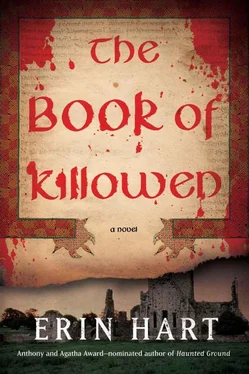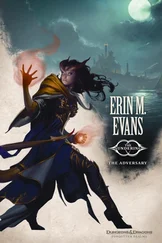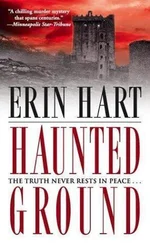Stella arrived at Killowen at half past eight. The evening light was still bright, but a sliver of moon had risen over the oak wood, a silver crescent magnified by the late-summer damp. She entered by the front door, following the sound of a flute playing a slow air to the yoga studio, where the wake was under way. Flowers and candlelight, and a low murmur of conversation filled the room.
She paid her respects, standing beside the girl’s pale body laid out in the coffin, again feeling a twinge at the realization that this was someone’s daughter, not much older than her own child. She noticed Cormac Maguire in the opposite corner, elbows on knees, ebony flute in one hand. He must have been playing the air she’d heard coming through the house. As Stella withdrew, he lifted the instrument to his lips again and launched into another slow air, a lament.
Claire Finnerty entered the studio and crossed immediately to the coffin. She stood for a long while, five minutes or more, looking down into the dead girl’s face. She bowed her head and began to whisper, her lips moving silently. Was it a prayer, a message to carry into the afterlife, some sort of incantation? Eventually, Claire straightened and reached for a thorny branch among the flowers. She snapped a sharp thorn from the cane, then drew back her sleeve, and plunged it into the flesh of her forearm. She made no sound but drew the thorn out again and pressed the flesh to stop any bleeding.
Stella knew that she must be invisible, behind a huge spray of leaves and flowers. As Claire left the room, Stella slipped from her place of concealment and followed, making sure not to be seen. She peered into the corridor, where Claire Finnerty stopped in front of each of the seven illuminations in turn, repeating the same ritual with the thorn in front of each. What strange sort of penance was this?
After Claire left, Stella approached the first picture. She was standing quite still, and yet there was a feeling of movement, going down and down, like the steps of a spiral staircase, until the outlines of a letter—no, several letters—suddenly loomed before her eyes: E, D, M . They were not just letters, but words—and they formed a name.
She stared at the picture again, and there was the name, still, where before she had seen only a jumble of shapes. Edmund Callan . She moved to the next picture and this time saw the name immediately: Margaret Rice . The third bore another, Gerard Nolan . And then she knew: these pictures were hidden memorials to the seven victims of the Cregganroe bombing. Visited daily by the person who felt responsible for their deaths. Perhaps there should have been an eighth, bearing the name of Tricia Woulfe, the girl Claire Finnerty had once been.
Stella stopped and gazed out the window. If Martin Gwynne had made these pictures, surely he had to know of Claire’s past—perhaps everyone at Killowen had known all along.
She suddenly felt the weight of the file in her bag and began to hear the never-ending echoes that would bounce from the walls of these farm buildings if she were to produce that file right now and start asking questions.
She reached the end of the corridor. Seven pictures, seven names. Stella could see Claire Finnerty’s head in the garden, stooping to gather herbs for the meal that would be a part of the wake. Diarmuid Lynch emerged from the kitchen to join her. They worked side by side for a moment, until Claire’s head dropped forward. Lynch put out a hand to lift her up, then he set aside his herbs and gathered Claire to him, smoothing her hair, drying her eyes with kisses.
Stella remembered the words Claire had spoken in the entry at the station this afternoon. Digging in the dirt and growing things sometimes has a healing effect. And Stella understood what this place was, what it could become, if she made inquiries as she’d promised. She left the farmhouse and crossed the haggard to the burned-out creamery storehouse, pulling a handful of photographs from her bag and setting them on fire in a metal bin, watching as the flames consumed them.
“She has my author,” Joseph Maguire said. His eyes pleaded with Cormac to draw sense from his urgent words. “My author, my author!” His hands pressed against his chest, then bounded forward. He was in his pajamas and robe, pacing back and forth across his tiny room, refusing to go to sleep this night until they took his meaning.
“Author,” he said again, and this time the pitch of his voice rose. Cormac stopped his father pacing and stood directly in front of him.
“Show me,” he said, seizing Joseph’s wrists and holding his hands up between them. “Please. Use your hands and show me what you mean.”
The old man looked down at his hands, and the agitation seemed to drain out of him. “Peas,” he said weakly, his voice reduced to a whisper.
Back to the vegetables , Cormac thought. And it always came back around to peas, never runner beans or beetroot or cabbage.
“La imagen de mi paz. Mi preciosa paz.”
Cormac cursed his limited knowledge of Spanish. Paz was peace, that was all he knew. His father seemed to be saying, My precious peace —but what did that mean?
The old man sat down on the edge of the bed, exhausted and frustrated, and with one sweep of his arm sent everything on the bedside table flying: the drinking glass shattered against the wall, and all the familiar, comfortable things Cormac had brought along to re-create his room at home scattered across the hard floor.
He couldn’t blame his father for lashing out, even though the sudden violence was jarring. Cormac took a deep breath and sat beside the old man on the bed, looking down into the tumble of books and pictures. Why had he even brought these things on this journey? The books had been on his father’s nightstand when he’d had the stroke. It had never occurred to him that the old man might be frustrated that he could no longer read them.
A white square stood out against a book cover. Cormac bent to pick it up and found a photograph with a date faintly penciled on the back: Noviembre 1983 . The spelling was Spanish, but it was definitely his father’s handwriting, still so Irish in character. Turning it over, Cormac found a black-and-white image of his father with a lovely dark-haired young woman. A wedding photo. If he hadn’t spied the date, he could have sworn the bride was Eliana—
Suddenly, he knew. The subtle evasions he’d sensed when asking about her home and family; his father’s obsession with the girl, which he and Nora had mistakenly read as unseemly intemperance. But it was something more.
He knelt beside the bed and reached for the old man’s hand, placing the tiny photo on his outstretched palm. “Who is she?”
“Peas-Pease,” he began, and stopped. “PAZ!” He’d finally managed to spit it out. Then he added, “Es-esposa.”
Cormac knew that much Spanish, at least— wife . “Where is she now?” he asked.
The old man did not reply in words this time but drew together the fingers of his right hand, which then exploded. Poof.
“She disappeared?” The old man shook his head, and Cormac suddenly remembered where on the planet his father had spent all those years. “She was ‘disappeared’? She’s so like Eliana—”
Joseph reached out and placed his two palms on Cormac’s chest. “My sum,” he said. His left hand stretched to the doorway, pointing to Eliana’s room next door. “My author,” the old man whispered, and this time Cormac felt the sense of it shining through at last. My daughter. For days, his father had been trying to tell them who the girl was, and every day he’d been flailing in that whirlwind of garbled words inside his brain.
Читать дальше












